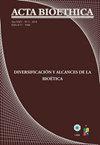Steps Towards Legalization of Euthanasia in Portugal
IF 0.3
4区 哲学
引用次数: 0
Abstract
In a world where everyone has their own beliefs and opinions, sometimes being extremely polarized, the subject of Euthanasia raises a lot of uncertainties and questions. It is way more than just a medical ethical problem, legal, religious, political, and philosophical arguments are brought into the discussion. As societies evolve, the way this topic is viewed changes, for this reason the number of countries which have legalized euthanasia or assisted suicide is growing. Despite of the different perspectives, either side of this debate has the same concern: the respect for the principle of human dignity. Portuguese society has been considering this topic for a long time, the prospect of having a law that allows patients in a situation of permanent and unbearable suffering to end their lives was brought to parliament being approved for the first time in January 2021 and then declared unconstitutional by the Constitutional Court and vetoed by the President of The Republic in March 2021. Subsequently, after a change in the decree that clarified the initial doubts that led to its rejection, the document was again vetoed by President Marcelo in November 2021. More recently, in June 2022 a new version of the decriminalization of euthanasia was approved, the opinions are divided, and the country is awaiting a response from its President, who has already affirmed that everything is open. Therefore, it is relevant to understand the legal aspects related to this subject. For the purpose of this research, it is necessary to comprehend the Portuguese legal order and Portuguese thoughts and views leading to a possible future decriminalization.葡萄牙迈向安乐死合法化的步骤
在一个每个人都有自己的信仰和观点的世界里,有时是极端两极化的,安乐死的主题提出了很多不确定性和问题。这不仅仅是一个医学伦理问题,法律、宗教、政治和哲学方面的争论也被纳入讨论。随着社会的发展,人们看待这个话题的方式也发生了变化,因此,使安乐死或协助自杀合法化的国家越来越多。尽管观点不同,但辩论双方都有同样的关切:尊重人的尊严原则。葡萄牙社会长期以来一直在考虑这个问题,2021年1月,一项允许处于永久和无法忍受的痛苦的患者结束生命的法律被提交给议会,首次获得批准,然后被宪法法院宣布违宪,并于2021年3月被共和国总统否决。随后,在法令进行了修改,澄清了导致其被否决的最初疑虑之后,该文件于2021年11月再次被马塞洛总统否决。最近,在2022年6月,安乐死合法化的新版本获得了批准,意见分歧,国家正在等待总统的回应,他已经确认一切都是开放的。因此,了解与此主题相关的法律方面是相关的。为了本研究的目的,有必要了解葡萄牙的法律秩序和葡萄牙人的思想和观点,导致未来可能的非刑事化。
本文章由计算机程序翻译,如有差异,请以英文原文为准。
求助全文
约1分钟内获得全文
求助全文
来源期刊

Acta Bioethica
医学-卫生政策
CiteScore
0.60
自引率
0.00%
发文量
22
审稿时长
1 months
期刊介绍:
Acta Bioethica is a biannual publication by the Interdisciplinary Center for Studies in Bioethics of the University of Chile (ISSN 0717-5906, press edition, y 1726-569-X, electronic edition), which publishes in three languages: Spanish, English and Portuguese.
Indexed in Science Citation Index (SCI), Scopus, Lilacs, SciELO y Latindex, and in database from several Institutions; it constitutes a pluralistic source of perspectives and an important tribune which accepts the contributions of authors compromised with the interdisciplinary study of ethical determinants and consequences of techno scientific research.
 求助内容:
求助内容: 应助结果提醒方式:
应助结果提醒方式:


